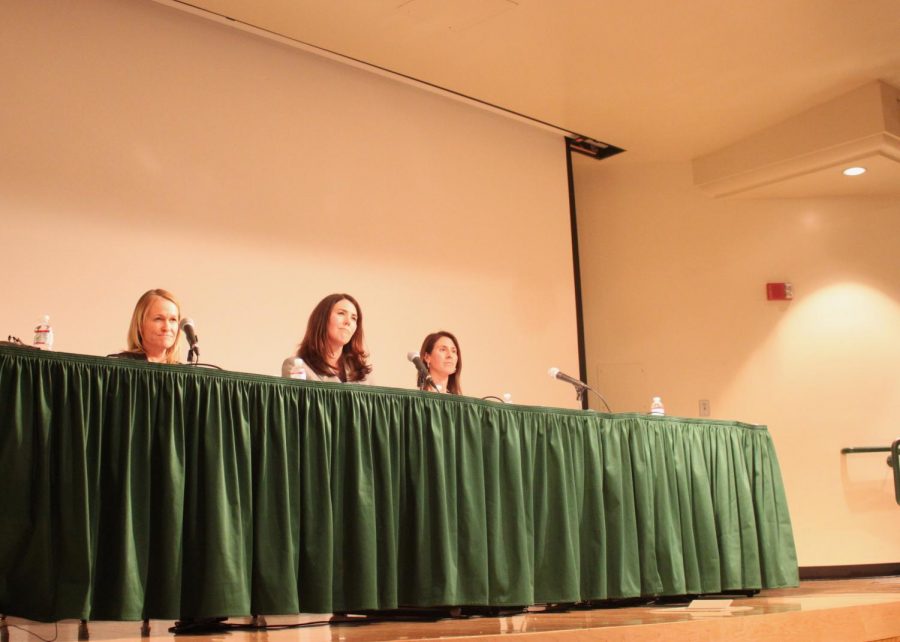Sac State panel discusses future of women in politics
Jordan Silva-Benham — The State Hornet
From left: Kristen Tudor, Sarah Kirby-Gonzalez and Rebecca Kluchin speak at the “Women in Politics – Does Policy Make a Difference?” panel on Tuesday, March 12 in the Hinde auditorium. The panel was a part of a series to help celebrate women’s history month on campus.
March 14, 2019
Sacramento State hosted a panel featuring five women who spoke on the topic of women in politics following the 2018 “Year of the Woman” — a perceived “wave” election of women candidates who won in the midterm elections.
The two panels were part of the “Women and Politics: Past, Present and Future” event sponsored by the women’s studies and communication studies departments, Project for an Informed Electorate and the Office of Public Affairs and Advocacy.
The panels were titled “2018’s ‘Year of the Woman’ – Springboard to Political Gender Equality or One Time Phenomenon?” and “Electing Political Women, Making a Policy Difference,” and were moderated by communication studies professor Rebecca LaVally.
The first panel included California State Controller Betty Yee and Assemblywoman Susan Talamantes Eggman. They both spoke about the increase of women elected to political office last year.
According to the Center of American Women and Politics, there were 105 women in Congress in 2016 and 127 in 2018.
“What’s really been on my mind over the course of the last few months since the election is really this question of whether what we witnessed last November is something that is going to be sustained,” Yee said. “I’m of the mind that this is not a one shot kind of a deal. This is for the long haul.”
Eggman spoke about the amount of women who won during the midterm elections.
“We said on election day, sometimes you think about things like Christmas. But this was like Hanukkah, the gifts just kept coming,” Eggman said.
During the Q&A following the panel, both Yee and Eggman encouraged women to be politically involved — whether by running for office, donating, or volunteering for local campaigns.
The second panel included two Sac State faculty members, history professor Rebecca Kluchin and communication studies director of debate Kristen Tudor. It also included Sarah Kirby-Gonzalez, a Sac State alumna and current board member for the Washington Unified School District in West Sacramento.
Each woman described her respective roles and experiences, beginning with Kluchin, who said she has done extensive research into women’s reproductive rights.
Kluchin described the speakout model, which stemmed from the 1970s when a group of women got together to discuss the ramifications of birth control, in what they called a “speakout.” She said the abortion rights group utilized the same tactic.
“You say it out loud and you get rid of the stigma,” Kluchin said. “You get rid of the shame and you get a whole lot of support.”
According to Kluchin, this model can be seen in the #MeToo movement on social media that encouraged women to speak out about their experience with sexual harassment and assault.
Tudor explained her experiences being a woman in the debate field, a predominantly male activity.
“One of the reasons I am passionate about debate and why I’ve made a career out of it, is because it is really a training ground for leaders, and it’s a place where people can find their voices,” she said.
Tudor occasionally leads a public speaking training at the Women’s Policy Institute, a part of the Women’s Foundation of California, where she works primarily with formerly incarcerated, formerly homeless, or transgender women.
Tudor said the women she works with made her realize that women tend to have a strong connection to social issues and characteristics for strong leadership, such as listening and striving for consensus, along with a tendency towards mentorship.
The last speaker, Kirby-Gonzalez, described her journey to be a school board member. She began as a fifth grade teacher who saw problems in government policy.
She said she went to an informational meeting for the school board position.
“I sat down and I looked around and we all introduced ourselves and I realized pretty quickly that I was the most qualified person sitting there,” Kirby-Gonzalez said. She ran for the position and won.
“I will acknowledge that I feel like my role is harder than my male colleagues, in terms of the things we have to balance sometimes in our lives,” Kirby-Gonzalez said.
Justin Kanenaga, a fourth-year organizational communications major attended the event for extra credit.
“There was a lot of experiences public servicewomen and I think they shared a lot of aspects that students, especially the younger generation don’t really look for,” Kanenaga said.
Kristen Cantor, a junior interior architecture major also attended the event for extra credit for her women’s studies course.
“This panel definitely opened my eyes a little more in being confident in what I want to say … I think that was inspiring,” Cantor said.





























































































































